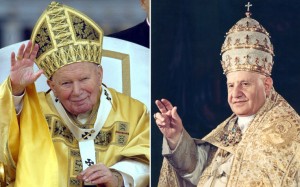 MARCO RONCALLI E PIOTR MAZURKIEWICZ SU WWW.EURCOM.ORG SCRIVONO SUI DUE PAPI SANTI E L’EUROPA
MARCO RONCALLI E PIOTR MAZURKIEWICZ SU WWW.EURCOM.ORG SCRIVONO SUI DUE PAPI SANTI E L’EUROPA
(28/03/2014) – I due papi santi e l’Europa. Alla vigilia delle canonizzazioni Eurcom (www.eurcom.org) propone uno speciale con i contributi di Marco Roncalli (giornalista, autore di “Papa Giovanni il Santo” tradotto in sei lingue) e Piotr Mazurkiewicz (Card. Stefan Wyszynski University – Cracovia).
«Secondo Giovanni Paolo II – scrive Marco Roncalli – l’Europa è un continente di cultura e suoi confini coincidono con i confini dell’evangelizzazione. “L’identità europea è incomprensibile senza il cristianesimo”, ha detto a Santiago de Compostela. Altre correnti hanno co-creato l’identità europea, ma senza di loro la cultura europea sarebbe più povera, senza il cristianesimo non sarebbe mai stata formata». «Giovanni Paolo II ha usato due metafore: dei due polmoni (cristianesimo orientale e occidentale) e dell’Europa dall’Atlantico agli Urali. In entrambi i casi – vale sottolineare – questo include paesi come l’Ucraina e la Moldavia».
«Giovanni Paolo II – conclude Roncalli – era molto deluso per la mancanza del riferimento a Dio nella Carta dei diritti fondamentali e nel Trattato costituzionale. La smemoratezza di Dio conduce alla smemoratezza dell’uomo e della sua dignità. Tuttavia, la Chiesa non può mai lasciarsi utilizzare strumentalmente ai fini di una demagogia antieuropea. “Dunque non c’è altra alternativa per un’Europa unita” (1997)».
Da giovane prete, Giovanni XXIII «s’interroga – scrive Piotr Mazurkiewicz – sulla contrapposizione tra la vecchia Europa e la civiltà nuova dell’America» e, «quando visita qualche Paese europeo accanto al vescovo di Bergamo di cui è segretario, monsignor Giacomo Maria Radini Tedeschi, dimostra di ben comprendere che il suo sguardo sul mondo e la sua preghiera devono andare oltralpe e oltreoceano».
«Roncalli è stato l’inventore per così dire dell’ostpolitik, dell’apertura all’Est dell’Europa che doveva portare, anche dopo la Conferenza di Helsinki, a una maggior libertà di professione religiosa. Quest’apertura non ha forse favorito, a distanza, la possibilità per questi Paesi, svincolati dal gioco di regimi totalitari, di appartenere all’Europa della democrazia? Non ha forse anticipato l’idea dell’Europa che respira con due polmoni, l’Oriente e l’Occidente, contro i particolarismi e gli egoismi che persistono? E che dire della solenne affermazione, proprio durante il pontificato circa “siffatto bene comune europeo” che “esiste Uno e universale” e “per sua stessa definizione non potrebbe favorire una nazione a detrimento di un ‘altra”?».
MARCO RONCALLI AND PIOTR MAZURKIEWICZ ON WWW.EURCOM.ORG ABOUT
THE TWO SAINT POPES AND EUROPE
(26/04/2014) – The two saint popes and Europe. On the day before the canonizations, Eurcom (www.eurcom.org) proposes a special report with the contributions of Marco Roncalli (journalist, author of “Papa Giovanni il Santo” (“Pope John, the Saint”, translated into six languages) and Piotr Mazurkiewicz (Card. Stefan Wyszynski University – Krakov).
«According to John Paul II – Marco Roncalli says – Europe is a continent of culture and its boundaries coincide with the boundaries of evangelization. “The European identity is incomprehensible without Christianity”, he said in Santiago de Compostela. Other currents have co-created the European identity, but if without them European culture would be poorer, without Christianity it would have never been formed». «John Paul II used two metaphors: the two lungs (Eastern and Western Christianity) and Europe from the Atlantic to the Urals. In both cases – it should be stressed – this includes countries such as Ukraine and Moldova».
«John Paul II – Roncalli concludes – was very disappointed with the lack of reference to God in the Charter of Fundamental Rights and in the Constitutional Treaty. The forgetfulness of God leads to forgetfulness of man and his dignity. But he pointed out that the Church should never be abused by anti-European populism. “There is no alternative for a united Europe” (1997)».
As a young priest, John XXIII «looked into his own conscience – Piotr Mazurkiewicz writes – about the opposition between old Europe and the new American civilization» and, «when he visited some European countries as the secretary to the bishop of Bergamo, Mgr. Giacomo Maria Radini Tedeschi, it was clear how well he understood that his world view and his prayers should get well beyond the Alps and overseas».
«Roncalli was the ‘inventor’ – so to speak – of Ostpolitik, i.e. the opening to Eastern Europe, which was to lead, also after the Helsinki Conference, to greater freedom in terms of religious confession. And is it not true that this opening has paved the way, in the long term, to the possibility for these countries, after they got rid of their totalitarian regimes, to belong to the Europe of democracy? Didn’t he anticipate the idea of Europe breathing with two lungs, the East and the West, in opposition to persisting forms of particularism and selfishness? And what about his solemn assertion, specifically during his pontificate, about “such a common European good” that “exists as One and universal” and “by its very definition cannot favor any given nation at the expense of another one”?».
26/04/2014
press@eurcom.org

